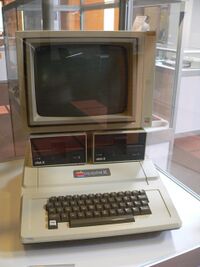Difference between revisions of "Apple II"
(Make the image smaller) |
m (→External links: +System Description: The Apple-II) |
||
| Line 75: | Line 75: | ||
==External links== | ==External links== | ||
| − | + | ||
| + | * Stephen Wozniak, [https://www.1000bit.it/support/articoli/apple/The-Apple-II-by-Stephen-Wozniak.pdf System Description: The Apple-II] | ||
* [http://www.laughton.com/Apple/Apple.html Apple Computer The Early Days A Personal Perspective] | * [http://www.laughton.com/Apple/Apple.html Apple Computer The Early Days A Personal Perspective] | ||
Latest revision as of 21:52, 21 December 2024
| Apple II | |
 An Apple II with monitor and two Disk II drives. | |
| Manufacturer: | Apple Computer Inc. |
|---|---|
| Year Introduced: | June 5, 1977 |
| Clock Speed: | 1 MHz |
| Memory Size: | 4 KiB by default, up to 48 KiB |
| Graphics: | 24x40 text NTSC composite output, several graphics modes |
| CPU: | MOS 6502 |
The Apple II was the second computer sold by Apple, and their first major commercial success.
How To Use
Okay, so you've got yourself an original Apple II. For some reason, it was decided that the Apple II shouldn't start up into BASIC. Oh no, it starts up into the Apple II Monitor. A very simple program allowing you to enter, view and execute machine language programs. So if you just want to get your old Apple to do something, you'll probably want to enter Integer BASIC. You're looking at this:
@@@@@@@@@@@@@@@@@@@@@@@@@@@@@@@@@@@@@@@@ @@@@@@@@@@@@@@@@@@@@@@@@@@@@@@@@@@@@@@@@ @@@@@@@@@@@@@@@@@@@@@@@@@@@@@@@@@@@@@@@@ @@@@@@@@@@@@@@@@@@@@@@@@@@@@@@@@@@@@@@@@ @@@@@@@@@@@@@@@@@@@@@@@@@@@@@@@@@@@@@@@@ @@@@@@@@@@@@@@@@@@@@@@@@@@@@@@@@@@@@@@@@ @@@@@@@@@@@@@@@@@@@@@@@@@@@@@@@@@@@@@@@@ @@@@@@@@@@@@@@@@@@@@@@@@@@@@@@@@@@@@@@@@ @@@@@@@@@@@@@@@@@@@@@@@@@@@@@@@@@@@@@@@@ @@@@@@@@@@@@@@@@@@@@@@@@@@@@@@@@@@@@@@@@ @@@@@@@@@@@@@@@@@@@@@@@@@@@@@@@@@@@@@@@@ @@@@@@@@@@@@@@@@@@@@@@@@@@@@@@@@@@@@@@@@ @@@@@@@@@@@@@@@@@@@@@@@@@@@@@@@@@@@@@@@@ @@@@@@@@@@@@@@@@@@@@@@@@@@@@@@@@@@@@@@@@ @@@@@@@@@@@@@@@@@@@@@@@@@@@@@@@@@@@@@@@@ @@@@@@@@@@@@@@@@@@@@@@@@@@@@@@@@@@@@@@@@ @@@@@@@@@@@@@@@@@@@@@@@@@@@@@@@@@@@@@@@@ @@@@@@@@@@@@@@@@@@@@@@@@@@@@@@@@@@@@@@@@ @@@@@@@@@@@@@@@@@@@@@@@@@@@@@@@@@@@@@@@@ @@@@@@@@@@@@@@@@@@@@@@@@@@@@@@@@@@@@@@@@ @@@@@@@@@@@@@@@@@@@@@@@@@@@@@@@@@@@@@@@@ @@@@@@@@@@@@@@@@@@@@@@@@@@@@@@@@@@@@@@@@ *
This is the Monitor prompt. You'll probably want to enter
E000G
This will jump to the address E000 and begin execution. This happens to be the location of Integer BASIC in ROM.
*E000G >
You should enter a simple Hello World! program.
>10 PRINT "HELLO" >20 END >LIST 10 PRINT "HELLO" 20 END >RUN HELLO >
At this point, you might want to learn more about Integer BASIC, 6502 assembly and the Apple II programming model.
External links
- Stephen Wozniak, System Description: The Apple-II
- Apple Computer The Early Days A Personal Perspective
| v • d • e Apple Computers, Software and Peripherals |
|---|
| Apple computers - Apple I • Apple II • Apple II+ • Apple IIe • Apple IIc • Apple IIGS
Apple computer software - Applesoft BASIC • Integer BASIC • Apple DOS • ProDOS • Apple II Machine Language Monitor • Apple II ROMs Apple computer accessories - DuoDisk • Disk II Apple computer related - MOS 6502 |